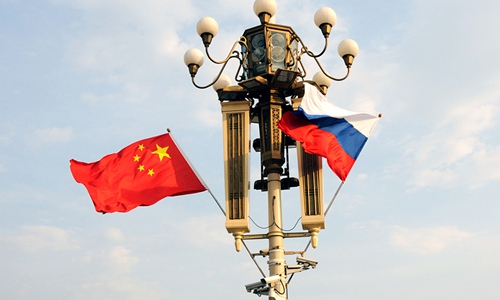China, Russia to expand economic, energy and agriculture cooperation
By Wang Cong Source: Global Times Published: 2020/12/2 20:53:08

China Russia. Photo: VCG
China and Russia are moving closer to further coordinate and cooperate in a wide range of areas, from epidemic control and prevention to trade, as both countries face an increasingly uncertain and risky external environment marked by not just the COVID-19 pandemic but also economic bullying led by the US.
In continuation of a quarter-century tradition, Chinese Premier Li Keqiang and Russian Prime Minister Mikhail Mishustin held the 25th regular meeting between Chinese and Russian heads of government via video conference on Wednesday, where the two leaders called for closer coordination and cooperation in many areas, including bilateral trade.
In particular, the two countries are seeking breakthroughs in cooperation in agriculture, energy and a host of other areas, as they aim to significantly lift bilateral trade this year, despite disruptions to global trade brought by the COVID-19 pandemic.
During the meeting, Li also called for joint efforts to safeguard the global multilateral system and better coordination between the Belt and Road Initiative and Russia's own development strategies, according to China Central Television.
"Against the backdrop of the global pandemic, the two sides are constantly interacting, actually huddling together for warmth. It's not just the epidemic, there is also growing hostility combined with a series of crackdowns from some Western countries, led by the US," Lü Chao, a fellow at the Liaoning Academy of Social Sciences, told the Global Times on Wednesday, adding that both sides have formed a "tacit agreement" on many international affairs and pragmatic cooperation in trade should catch up.
In 2019, bilateral trade reached about $111 billion, significantly up from about $21.2 billion in 2004, according to some media reports. However, that number is still very low compared with bilateral trade between China and the US, which reached about $558.9 billion in 2019, despite a bruising trade war that brought bilateral trade down by roughly 15 percent year-on-year.
"In terms of trade, the two countries indeed need more work to fully realize the massive potential," Lü said, noting that the two countries are complementary in many areas and are neighbors closely connected by transport networks. "All told, the bilateral relationship is in its best period."
The heads of government meeting, which was first established in 1996, followed several high-level engagements between Chinese and Russian leaders, including at the recently concluded BRICS Summit, hosted by Russian President Vladimir Putin.
On November 24, Chinese Vice Premier Hu Chunhua and Russian Deputy Prime Minister Dmitry Chernyshenko held a regular meeting via video link, where they said they will aim for growth in bilateral trade this year and pursue cooperation in agriculture.
Also at the end of November, top officials from both sides met virtually on strengthening cooperation in energy and technology. Energy exports, for example, account for over 60 percent of Russia's total trade.
"Energy is a big area for China-Russia cooperation and there is still massive potential as more infrastructure would be built and energy security has become a pressing issue, given the COVID-19 pandemic and geopolitical tensions," Lin Boqiang, director of the China Center for Energy Economics Research at Xiamen University, told the Global Times on Wednesday, adding that Russia has sufficient supply to meet China's demand and can also securely transport energy to China free of external risks.
There are several energy pipelines between the two countries, with others under construction, including an oil pipeline that went into operation in 2011 and sends about 30 million tons of crude to China each year.
In late 2019, the two countries opened a new natural gas line and more are coming. Last year, crude oil from Russia accounted for 15 percent of China's total oil imports, and experts said that the ratio could increase substantially going forward.
Another area of bilateral trade with huge potential is agriculture, specifically soybeans, experts noted. China has massive demand for soybeans and other products, while Russia is a big agricultural exporter. During the January-August period, Russian soybean sales to China increased 9 percent year-on-year to 490,000 tons, despite China's huge imports of soybeans from the US and South America.
Wang Jun, an expert at the China Center for International Economic Exchanges in Beijing, said that under China's new "dual circulation" development strategy, China will continue to push for more trade deals and further open up its domestic market to more foreign products, and Russian products will no doubt benefit from that.
RELATED ARTICLES:
- Fears over supply chain from COVID-19 cases in imported Russian seafood
- Manzhouli tightens land ports after virus strain found similar to that in Russia
- Immersive multimedia exhibition "I Aivazovsky" displayed in Moscow, Russia
- Russian Armed Forces Begin Mass COVID-19 Vaccination to Cover 400,000 Servicemen
Posted in: ECONOMY,BIZ FOCUS